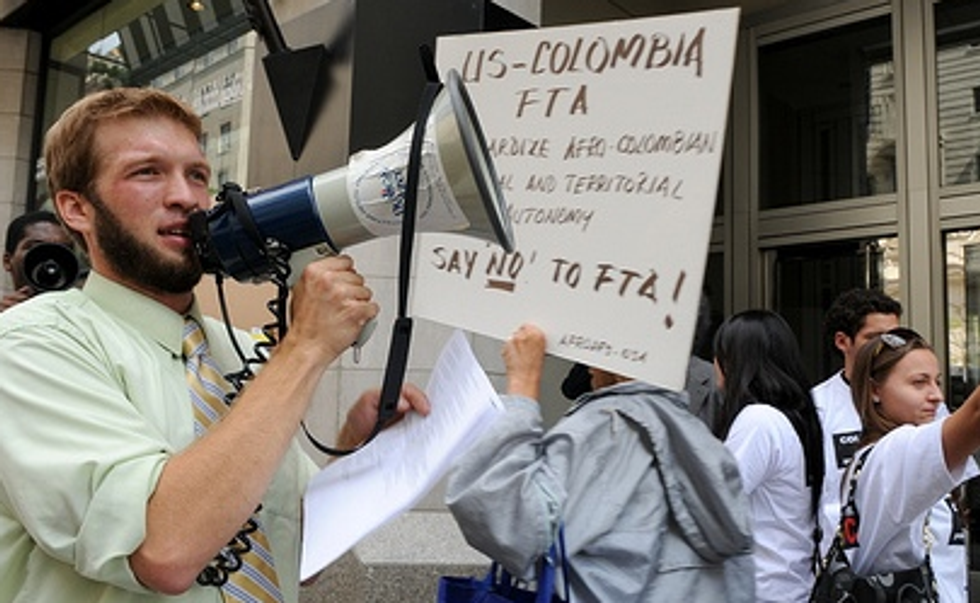After a slight scheduling kerfuffle, President Obama is now set to give a major speech on jobs before a joint session of Congress next Thursday, September 8. Commentators have speculated that Obama could "go big" in his proposals to fight unemployment, and there are some solid suggestions on the table for how the government could help put Americans back to work. These include major investment in public infrastructure and changing the tax structure in order to reward businesses for creating U.S. jobs, rather than off-shoring their production abroad.
Unfortunately, Obama is also likely to advance some bad ideas. In his pledge to "to find bipartisan solutions" to the country's economic problems, the president will almost certainly push several neoliberal "free trade" agreements. Specifically, he is expected to reassert his support for previously stalled trade pacts with Colombia, Panama, and South Korea.
As Lori Wallach argues, "whatever one thinks about the idea of 'free trade,' the federal government's own studies predict that these three deals would increase the U.S. trade deficit--costing more jobs than they create." Wallach's organization, Global Trade Watch, has had to regularly correct news reports that uncritically accept false numbers about trade. In a post on why "Trade Does Not Equal Jobs," even Paul Krugman, normally a trade booster, has argued that claims about the South Korea trade agreement being an engine of job creation are bunk.
The idea that "free trade" is in fact a bipartisan issue is also debatable. It's true that President Bill Clinton and his generation of "New Democrats" enthusiastically embraced NAFTA and other neoliberal trade deals--and were far more serious about creating hemisphere-wide pacts like the Free Trade Area of the Americas (FTAA) than the administration of George W. Bush ever was. (The argument of my 2008 book, How to Rule the World: The Coming Battle Over the Global Economy, was that a new Democratic president would be likely to repudiate Bush's unilateralist, America-first brand of "imperial globalization," but would revert to promoting a friendlier, more multilateral form of "corporate globalization"--different in some respects, but plenty bad in its own right. Obama hasn't done much to disprove this thesis.)
Yet while Bill Clinton and the Democratic Leadership Council led the "free trade" charge in the 1990s, it is not at all clear that this can still be called a "Democratic" position--and thus form part of bipartisan platform. In the past decade, recognizing a strong voter backlash against the neoliberal trade agenda, Democratic elected officials have increasingly embraced a pro-worker, pro-environment "fair trade" agenda. Global Trade Watch has documented that the fair trade platform was effective even in the 2010 midterms, when the Republicans made gains overall. In fact, many conservatives also adopted "fair trade" messaging, expressing skepticism about future trade deals made in the NAFTA mold.
Even Bill Clinton has shown some remorse for his "free trade" advocacy--at least in selected instances. With regard to Haiti, he said in March 2010 that pushing neoliberal policies was "a mistake" that hurt the poor in that country. "I had to live everyday with the consequences of the loss of capacity to produce a rice crop in Haiti to feed those people because of what I did; nobody else," he explained.
Apart from sentiments in Washington, it is clear that popular opinion would in no way justify pushing trade deals as a matter of broad, "bipartisan" agreement. Citing a November 2010 poll by the Pew Research Center that showed public support for "free trade" at one of its lowest points in over a decade, Dan Denvir recently pointed out at the Guardian that pushing through the stalled "free trade" agreements could well be a liability for Obama at the polls. Todd Tucker has previously made this case in even stronger terms, calling Obama's support for "free trade" pacts a "political death wish."
As a presidential candidate, still in a primary fight against Hillary Clinton, Obama recognized that the base of the party was squarely against "free trade" neoliberalism. He called NAFTA "devastating" and "a big mistake" on the campaign trail. Voters in 2012 will have every right to be disgusted by his subsequent "about-face."
While the more progressive elements of Obama's jobs agenda will no doubt have trouble getting through a Republican-controlled House of Representatives, passing the trade deals with Colombia, Panama, and South Korea would also be divisive, requiring him to split the Democrats in Congress. The president therefore has a choice: Fight the Republicans on domestic investment, or fight the prevailing sentiments of his own party--in Washington and beyond--on trade.



